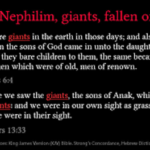The Bible And Myth
If visitors here at Spec Faith have read our Statement of Faith, to which we all agree if we write regular columns, they know that we believe the Bible. Part of that document reads as follows:
We believe the Bible is the only inspired, infallible, and authoritative Word of God, and our only sure source for knowing Who God is, what the Gospel is, and what we must do in response.
Unfortunately that belief in the Bible is not as widespread as it once was in western culture. In fact, more and more people who identify as Christian will say that they can’t accept things like “Jonah and the Whale” or “Noah and the Ark.” In other words, the supernatural things God did in the Old and New Testaments that seem impossible to us today.
Of course, supernatural events are not possible naturally. That’s how we know they are supernatural.
 But in this day and age when myth is popular and superheroes are in TV programs, movies, and games, let alone, in books, I wonder if the skepticism we need to enjoy the mythological might not affect our understanding of the Bible. I mean, look at the amazing feats accomplished by the Mutant X, a group of “new mutants who possess extraordinary powers as a result of genetic engineering,” portrayed in a TV program some fifteen years ago.
But in this day and age when myth is popular and superheroes are in TV programs, movies, and games, let alone, in books, I wonder if the skepticism we need to enjoy the mythological might not affect our understanding of the Bible. I mean, look at the amazing feats accomplished by the Mutant X, a group of “new mutants who possess extraordinary powers as a result of genetic engineering,” portrayed in a TV program some fifteen years ago.
Such characters in speculative stories do “the impossible,” but we have an understanding that, no, what we are seeing on the screen are not real people doing real things. We see it with our own eyes, but we understand it’s not true.
 I realize that I’ve taken that same skepticism into the way I look at photos. There are pictures with colors so vibrant, I question if they are real or if the photographer/artist/creator has enhanced them to make them pop, to “improve” on the nature which they supposedly represent.
I realize that I’ve taken that same skepticism into the way I look at photos. There are pictures with colors so vibrant, I question if they are real or if the photographer/artist/creator has enhanced them to make them pop, to “improve” on the nature which they supposedly represent.
Then there is fake news and the stories that we must view with a questioning eye because, who knows what context has been omitted or what person has been cropped from the picture or what slant has been taken to further support or undermine the actor/politician/athlete/teacher/policeman/religious figure, or whoever.
In other words, we can hear with our ears and see with our eyes, and still we have no idea if what’s been reported is accurate and true.
How does all this affect our understanding of the Bible? Has speculative literature undermined our belief in God’s word? Has the post-truth culture in which we live, undermined our belief in the Bible?
My own conviction since I started writing is that fantasy, in particular—which is filled with magic and dragons and faeries and orcs and Gollum and worlds that exist inside wardrobes—is a vehicle to illuminate the truth of Scripture, not confuse readers about its veracity.
J. R. R. Tolkien certainly made a case for readers, even children, understanding the difference between the real and the pretend. He would be one of those scoffing at the idea that Harry Potter readers would think that witches and wizards could do all the imaginary things depicted in J. K. Rowling’s wonderful series. He had no doubt that we have the ability to discern what is real and what is imagined. Some years ago, in a series of posts here at Spec Faith, we looked at what the “Father of Fantasy” believed about myth and imagination and “wonder.”
But the world is a different place from the one in which Tolkien lived. Art is different. Stories are different. And the way our culture looks at the Bible is different.
So what does separate fantasy and myth from the miraculous? How does a reader make the distinction between the pretend of a talking donkey in C. S. Lewis’s The Last Battle and a talking donkey in the Old Testament?
Atheists so often point to Scripture as filled with the unbelievable, no different from Greek myths or stories about Roman gods.
I fear that this same attitude has filtered into the Church. Which causes two opposing results.
First, a group of people denigrate the Bible. It’s all made up by people, filled with stories that are certainly not history. They are legend, passed down orally and exaggerated by each retelling. The danger there, of course, is that Jesus rising from the dead is categorized with all those other “myths.” In essence, then, we do not have a risen Savior. We have only a nice story.
The other result of this trend of looking at the Bible as nothing different from speculative fiction, is a denigration of fantasy and science fiction. The creative imaginings worked out in story become the evil Bible-believing Christians want to stamp out. The stories are the culprits leading people astray.
The truth is far from either position, and it’s up to us Christians who love speculative stories to state the facts clearly, I think. Yes, imaginative stories are imaginative. As a class, they are not leading children or adults into false beliefs. And yes, the Bible is true. It is not make-believe, pretend, intended for symbolic representation of a greater truth. It contains parables and poetry and picturesque language, but the events stated as historical, actually happened, to real people, even if they contained the miraculous.
The distinction needs to be clear in our minds first so we can make it clear to others who want to tear down either the Bible or speculative fiction.
As I see it, there is one major factor we must communicate: God is all powerful and can do the impossible. If we grasp this truth, then any miracle or “impossible” event recorded in the Bible has a clear and logical source. There should be no uncertainty, no skeptical denial. Since God can do the impossible, the Red Sea could part and God’s people cross on dry land. Since God can do the impossible, Daniel can survive a night in the midst of a den of lions. Since God can do the impossible, Peter can follow an angel and escape prison undetected. Basically the question should be, What couldn’t an all powerful God do?
In speculative fiction, Christians have the opportunity of creating worlds in which amazing things happen, peopled with amazing beings. Even if these speculative events make it to a screen and special effects put them before the public as if they really happened, there is no carry over to our world. People here still can’t make broomsticks fly. There are no dragons. No space ships taking us across galaxies to other worlds populated by alien cultures.
The world of imagination does not give us an excuse to dismiss the God of the impossible as if He is not real. And the record of His work in the world is not a reason to fear speculative stories, as if they must, because of their nature, lead us away from the reality of Scripture.












































As far as whether or not speculative stories convince people to dismiss God and scripture…that’s going to depend on a lot. Some people will have their faith in God increased, decreased, unmoved, or a mixture.
Fiction, especially modern fiction that tends to yield to audiences’ expectations of decent world building and a sense of realism and depth, has a way of showing how something COULD happen. At the very least they illustrate how spiritual things could exist even amongst science and technology and in spite of human disbelief. Instead of just kind of randomly having magic there for a sense of mystery and wonder, modern fantasy has a tendency to add some sort of system to it, to explain how it could actually be plausible in that story world. That will at least make some people realize that Christianity isn’t ‘stupid’, because they could see how people could believe in spirituality.
On the other hand, even modern fantasy can desensitize people. ‘The spirituality in this show looks real, so just because spirituality can be made to look plausible, doesn’t mean it is.’
That said, these things don’t happen in a vacuum. Like, usually people don’t read one book and then have all their beliefs turn a 180. Some people might, but usually it’s more like people have doubts or stresses deep inside them, and the book brings them out and makes them think about it. Or, they didn’t truly have a firm foundation in their beliefs or even their own self identity, which makes their mind easily changed by certain things that speak to them. Also, personality is going to interact with beliefs and experiences to make cognitive changes and incite behavior.
Interestingly enough, one SJW writer blog I read recently was criticizing people for dismissing things as ‘just fiction’. They gave examples of how fictional works changed or incited things in society. I agree with the concept, though that post oversimplified the issue and ignored a lot of dynamics in those situations. Imagine a little kid that reads a picture book. Exactly how they interpret that picture book is going to depend on what other people around them say about the characters’ behaviors. Personality comes into play as well, but personality stays pretty much no matter what(though we can potentially influence how those personality traits manifest).
So like…I dunno. Obviously fiction is going to have a big impact, but we can’t say ‘this exact depiction is always/usually going to incite this, so no one is ever allowed to write in this particular way’. That would ignore the circumstances and narrative put forth surrounding the story. This is probably why it’s good for authors to talk about their works sometimes, because they can help their audience interpret their stories in a constructive way, whether the issue is about spirituality or something else.
The Bible itself is true, though I’m highly skeptical of people’s interpretations of it. The Jewish and Greek culture/language back then was way different than that of the US or any other modern country. A lot of people seem to take their own ‘literal’ interpretation and act like everyone that doesn’t agree is a heathen, when they may very well be wrong.
I dunno either, Autumn. One minute I think the prevailing post-truth culture is a far bigger influence, but perhaps that has generated this interest in the pretend. Which speculative fiction feeds. And I can see how someone not convinced the Bible is true can look at it as if it’s just more of the pretend, the incredible, the impossible. That’s why I think I view of God should be central. If He can do the impossible, then why wouldn’t amazing things have happened?
And for the record. There was no “whale” in Jonah. A storm, a big fish, a plant that grew overnight, a worm that ate it. No whale. Those things that God caused were amazing, for sure. They show that God cares about our choices and our influence on others, on our attitudes. All that dissipates if it’s all considered pretend.
About the Bible and the original language. Yes, that’s what God inspired, but there are teams of scholars who pour over the texts in order to insure that the translations are accurate. There are some translations that favor a word-for-word accuracy. There are others that favor an idea for idea accuracy. And then there are paraphrases that try to give a contemporary understanding. There are so many choices today. Almost like going to a grocery store and finding so many brands and types of salad dressing, it’s hard to decide what is best. I think “which Bible” might be one of the most critical decisions a person can make. Even then there are passages that ought to be looked at comparatively–if five or seven translations lean one way, but there’s this other one that takes a new and different twist, I’d be highly suspicious of the new and different. Would God really let the Church go for 2000 years believing something that He didn’t really say? I doubt it. This idea that we now have reached a point where we can recognize error when believers for centuries could not, is highly suspicious, I think.
Becky
Hm…well, this is sort of an issue with translations and culture and such. Back then, they didn’t have the animal classification system that we do, so to them, a whale would have probably been a giant fish. So it’s harder to tell if the Bible would have been referring to a whale or not. A similar thing happens in the bible with bats, I think. If I recall correctly, they were referred to as birds at one point, though I’d have to check on that again.
Even if the language translations are accurate, the average person isn’t necessarily going to do their homework to understand which translation does what (whether a particular translation goes for word accuracy or idea accuracy, for instance)And, in either case, we are going to often be translating something in terms of our cultural context, rather than the one in which the work was written, so people might take the bible ‘literally’, but that’s only going to be according to their interpretation.
Language is extremely ambiguous, which is both a blessing and a curse. On one hand, it can be useful for poetic expression. On the other hand, it causes miscommunication between even people that speak the same language and live in the same culture. Imagine handing a text containing sarcasm to a culture that has no concept of sarcasm whatsover. That would greatly influence the interpretation of the text and the readers’ reaction to it, and that’s just one little example.
And I don’t think God babysits the church to that extent. If he did, there would be far fewer bad things that happen in the church, and less sins committed by people in church leadership positions. Maybe if someone is really close to God and is truly listening to him, God will guide them in their interpretations, but people can’t just read the bible, interpret it ‘literally’ and expect to get it right.
For today’s off-topic discussion: I present this article and my thoughts on it. https://www.psychologytoday.com/us/blog/the-craft-creativity/201902/i-now-pronounce-you-creative-partners
Maybe I would actually get more writing stuff accomplished if I was part of a duo (and had the pressure of their expectations to goad me on). Or maybe the grass is just greener on the other side. I dunno how well the idea of creative partnership really maps to a “marriage.”
In my own real-life marriage, my dude and I have different hobbies. He’ll listen to me ramble about my yarn, and I’ll watch him play vidya or watch his YouTube vidya reviewers with him, but he doesn’t yarn and I don’t actually vidya. We have hobbies in common, like the mechanics of storytelling (tho in different mediums) and mostly-clueless cookery and yelling at Hauspanzer to get off the coffee table.
Like, I wouldn’t feel it was cheating if I wrote horsey romances with Mark Carver but he collaborated with one of the Travises about some kind of sci-fi dystopia.
Have you tried roleplaying? Like where you make characters and write posts in which they respond to the role play posts written by other rpers? Might be a good way to get your feet wet, as far as collaborative writing goes. It can be difficult, but also very rewarding and fun when you find the right rps/rpers. It’s a great way to learn about writing, characterization, etc too.